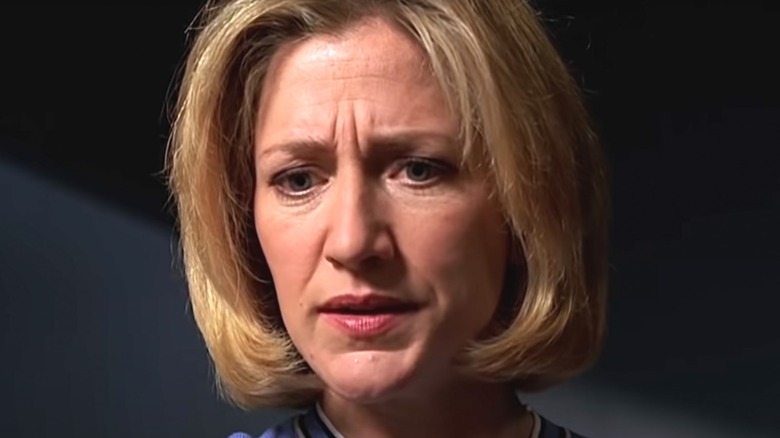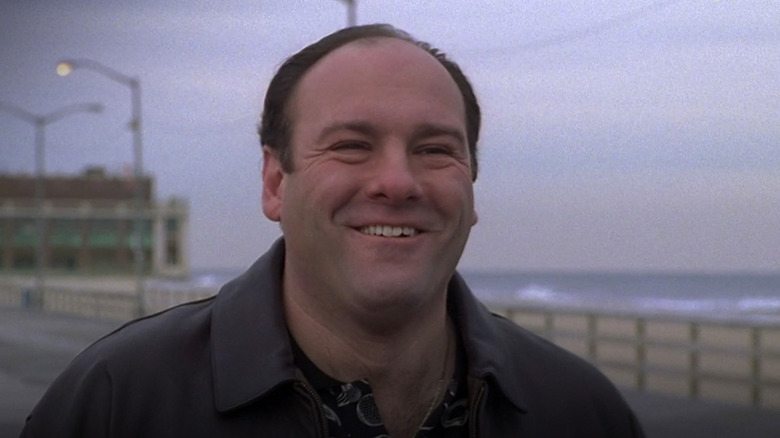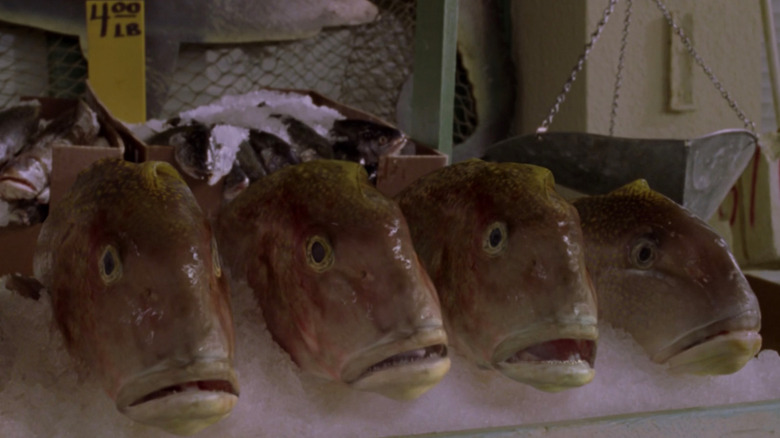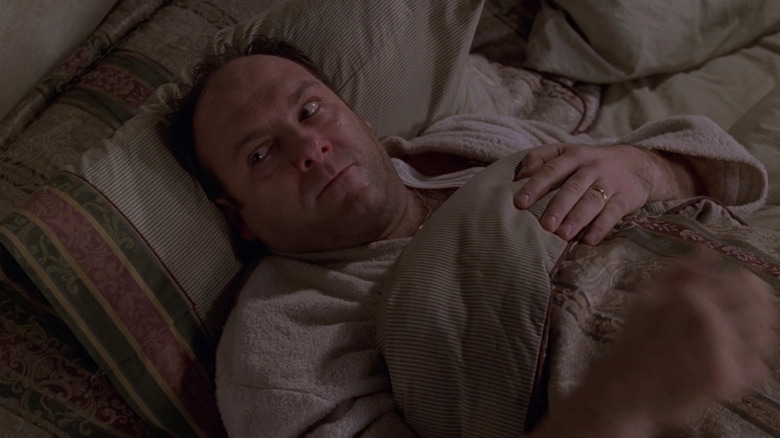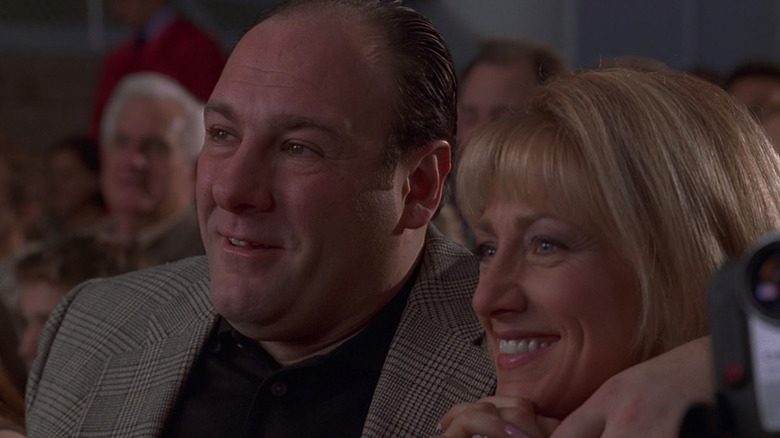The Ending Of The Sopranos Season 2 Explained
The second season of "The Sopranos" is a turning point in the series. In Season 1 and early in Season 2, Tony Soprano's (James Gandolfini) was searching for better mental health with the help of Dr. Melfi (Lorraine Braco), and competing with his uncle and rival Corrado "Junior" Soprano (Dominic Chianese). Despite that, Tony's life is on a steadily upward trajectory. His criminal enterprises are expanding, and he becomes the boss in everything but name after the previous boss Jackie Aprile (Michael Rispoli) dies of cancer. While the law is always pursuing Tony's crew, the integrity of the crew itself is intact.
All of that changes as Season 2 progresses. Gradually, Tony realizes that his close friend and associate Sal "Big Pussy" Bonpensiero has become an informant with the FBI. In the Season 2 finale, "Funhouse," Tony and the crew finally get definitive proof of Pussy's treachery. They deal with him, but from that point onward nothing is the same.
Here's what "Funhouse" is all about.
Wait, mob shows can have dream sequences?
This episode is heavy on the dream sequences, with six of Tony's dreams appearing overall. Previously, a fully realized dream sequence was unheard of in a mob movie or TV show. However, on "The Sopranos," it's totally justified.
As "Sopranos" creator David Chase explained to Martha P. Nochimson in her book "Dying to Belong: Gangster Movies in Hollywood and Hong Kong," "The Sopranos" has always been about psychology from the very first episode. "Those dreams are earned, because so much of psychotherapy has to do with dreams," Chase said, explaining his choices for the Season 2 finale.
However, Tony's dreams aren't just there for the sake of having them. Chase knew they had to serve a storytelling purpose. In the Season 2 finale, Tony's dreams are what tips him off about Pussy's treachery.
Chase considered a more straightforward procedural-style approach to this problem, which would have involved Tony figuring out by conducting his own investigation across several scenes. That option bored him, so he opted for the dreams instead. Chase was also inspired partly by his own experiences. Chase has had food poisoning multiple times, and it always gives him dark thoughts, emotions, and even dreams–just like the dreams Tony has in this episode.
A fish is also a rat
"The Sopranos" was always conscious of the mob movies that influenced it, especially the "Godfather" trilogy and "Goodfellas." "The Godfather" introduced pop culture to the phrase "sleeps with the fishes" as a euphemism to describe someone who's been whacked. It's no coincidence that the "Sopranos" Season 2 finale is full of fish imagery–and even a direct reference to that "Godfather" quote.
The first fish comes early in the episode, when Tony, Pussy (Vincent Pastore), and Furio (Federico Castelluccio) are eating dinner at an Indian restaurant. This is also the scene when Tony first suspects Pussy is a traitor–when Pussy explains a calling card scam to Furio in great detail, Tony subconsciously realizes that Pussy might be wearing a wire. During this scene, the camera lingers on a fish entree, foreshadowing what's in store for Pussy.
The next fish reference is obvious. Later, when Tony is suffering from food poisoning (more on this below), he has a fever dream in which Pussy appears to him as a fish on display at a fishmonger's stall. During the dream, fish-Pussy confesses his treachery, explains why he did it, and even makes a joke about the other fish next to him being "asleep"–a reference to that Godfather quote, and one that wouldn't be lost on Tony.
Sure enough, all of this is foreshadowing Pussy's eventual fate. The episode ends with Tony and his crew whacking Pussy and tossing his body in the ocean, where he'll euphemistically sleep with the fishes.
In mafia parlance, the typical animal that signifies a traitor is a rat. In this case, a fish fills in nicely.
Something is rotten in New Jersey
This is also the episode when Tony deals with a nasty case of food poisoning. The ordeal also doubles nicely as a metaphor for what Tony is going through with Pussy.
Coming into the episode, Tony and his crew have already been suspecting that Pussy is working with the feds. Tony's cop informant Vin Mazakian (John Heard) literally tells him as much in an earlier episode. Tony is avoiding the truth, and in the meantime Pussy's treachery is tainting the entire criminal operation.
Tony's food poisoning in the Season 2 finale isn't straightforward. He had two dinners the night before his illness. One was at an Indian restaurant, where he ate chicken vindaloo, and the other was at one of his favorite haunts, Nuovo Vesuvio, where he ate mussels. Throughout the episode, Tony blames the Indian restaurant for his illness, and his childhood friend and Nuovo Vesuvio's owner Artie Bucco (John Ventimiglia) insists his food is pure.
Later, Tony is forced to admit that Nuovo Vesuvio's is the culprit, when Pussy admits that he's suffering from diarrhea after also eating mussels–or, shellfish, which also ties back into the overall fish motif.
Just like the situation with Pussy and the FBI, Tony doesn't want to face the truth that his favorite restaurant gave him food poisoning. Tony would rather blame anyone or anything else, but in the end he's forced to face facts.
As always, it all goes back to family
The episode ends with a montage of Tony and his mafia family celebrating Meadow's (Jamie-Lynn Sigler) high school graduation, along with his actual family including Carmela (Edie Falco) and Anthony Jr. (Robert Iler). It's a moment when both of his families come together. While everyone is mingling and posing for family photos, the show juxtaposes these moments with shots of Tony's various criminal enterprises, like trash collection and the calling card scam. Then, in the episode's final moments, Tony is surrounded by people, but he's not engaging with any of them. He's alone, smoking a cigar. Finally, the show cuts to a shot of the ocean, which is Pussy's final resting place.
Like other mobsters in fiction, Tony tries to justify his sins by claiming that he does everything for his family–how many times has he bellowed about how hard he works to put food on the table? Yet Tony is never quite able to separate his criminal life from his personal life, and the montage reinforces this. The reality is that his crimes compromise his family life. He's never fully honest with his loved ones. He might be physically surrounded by them, but emotionally he's alone with his cigar.
